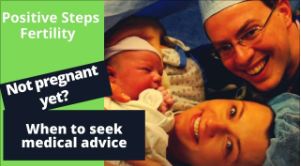Struggling to get pregnant isn’t just a biological issue; it’s a challenging, complex journey fraught with emotional upheaval.
According to The National Infertility Association, infertility affects 1 in 8 couples in the United States. Yet, despite its prevalence, the experience often feels isolating due to societal misconceptions and stigma.
The American College of Obstetricians and Gynecologists (ACOG) highlights that the emotional impact of infertility often mirrors that of other significant medical conditions such as cancer or heart disease. You might oscillate between feelings of denial, anger, guilt, depression, and acceptance, all of which can be overwhelming and stressful.
Infertility’s emotional burden can seep into every aspect of life, affecting your relationships, job performance, social interactions, and self-esteem. Studies published in Psychology Today noted that the stress and anxiety levels of women with infertility are equivalent to those of women dealing with cancer, HIV, or heart disease. These strong emotions and the consequent stress can create a cyclical effect, potentially affecting your overall well-being and sometimes even the efficacy of fertility treatments.
Two distinguished professionals, Dr. Preston Parry, a renowned Fertility Expert at Positive Steps Fertility, and Dr. Julianne Zweifel, an esteemed Clinical Psychologist from the University of Wisconsin Madison, recently lent their expertise to shed light on the multifaceted emotional impact of infertility. Drawing from their unique yet complementary specialties, they offered in-depth insights into this complex issue, helping those struggling to understand better how to deal with this emotional roller coaster.
Coping with Infertility: A Physical and Emotional Expert Point of View
Dr. Preston Parry stands at the forefront of fertility solutions, having dedicated his career to assisting couples in navigating the complex landscape of fertility. An internationally recognized fertility expert and Board-Certified OBGYN/REI, Dr. Parry passionately advocates for comprehensive care, including emotional support, for those facing fertility issues.
Complementing Dr. Parry’s approach, Dr. Julianne Zweifel brings a wealth of psychological expertise to the table. With her deep experience working on mental health issues related to reproductive health, Dr. Zweifel provides crucial insights into the mental health challenges faced by those undergoing fertility treatments or grappling with recurrent miscarriages.
Demystifying Stress and Fertility: Challenging Conventional Wisdom
One of the primary topics discussed by the experts was the controversial role of stress in fertility. Societal beliefs and mainstream media often perpetuate the narrative that stress is a significant hindrance to fertility. Dr. Zweifel, however, fervently debunks this myth, asserting that stress, in itself, does not critically impact the success of fertility treatments.
While some studies indicate a correlation between stress and fertility outcomes, Dr. Zweifel points out that these studies often have methodological flaws, making it difficult to separate cause and effect.
A patient’s initial mood or stress levels upon entering a fertility clinic may be influenced by prior experiences rather than independently predicting treatment outcomes. When considering well-designed studies—those that account for pre-existing conditions—there is no significant correlation between psychological variables and treatment success.
Supporting Dr. Zweifel’s view, Dr. Parry draws upon historical and epidemiological data, stating that fertility rates show minimal impact even in high-stress situations like war or economic upheaval. According to him, stress does not obstruct fertility pathways, like tube blockage or egg quality. However, he points out that stress could affect three stages: preconception, conception, and post-conception. For instance, extreme stress might lead to irregular ovulation, but fertility treatments typically account for such issues.
Medication Management: A Fine Balance During Pregnancy
The conversation takes an important turn when Dr. Zweifel discusses how patients often want to discontinue their antidepressants to create a “healthier” environment for pregnancy. However, she warns that stopping these medications can often trigger a resurgence of depressive or anxiety symptoms. She underscores the importance of informed decision-making, considering the potential risks and benefits of medication continuity during pregnancy.
Dr. Parry echoes this sentiment, reminding patients that avoiding medication also poses risks to the mother and the baby. He insists that decisions about medication should be personalized and taken in collaboration with healthcare providers.
Genetics and Hormones: The Invisible Influencers
Another significant aspect of the conversation was the role of genetics and hormonal fluctuations in mood changes during various reproductive phases such as menstruation, pregnancy, postpartum, and menopause.
Dr. Zweifel suggests that women with a strong history of anxiety or depression, or those who are severely affected by PMS-related mood changes, may need to continue their medication during pregnancy. Again, this needs to be coordinated with your healthcare provider and a fertility specialist who can provide care tailored to your specific circumstances.
The Right Time for Professional Intervention
Determining the right time to seek professional help for emotional distress during fertility struggles is a critical topic that the experts explored. Dr. Zweifel advises individuals to consistently monitor their emotional health during their fertility journey. If they notice a consistent shift towards emotional heaviness or unhappiness, it might be time to seek professional help. Given the typically long wait times for appointments, she suggests reaching out sooner rather than later, particularly if emotional well-being appears to be deteriorating.
While waiting for professional help, she recommends not allowing every decision to hinge on fertility care. Despite the necessary sacrifices, over-regulating one’s life to the point of feeling deprived and isolated can exacerbate feelings of loss and worsen mental health.
Stress Reduction: Lifestyle Changes for Enhanced Well-Being
Physically and Mentally Reducing Stress
As part of a comprehensive care approach, Dr. Zweifel and Dr. Parry discuss various lifestyle changes that can potentially reduce stress. They highlight the benefits of regular exercise for not just physical health but also emotional well-being.
Social interaction is also emphasized as a crucial component for maintaining a healthy mindset during the emotional turmoil of fertility struggles. They advise individuals to share their feelings with loved ones and utilize humor as a coping mechanism.
Challenging the common notion that stress negatively impacts fertility, Dr. Parry cites a study that suggests more stressed individuals are often more proactive in seeking solutions. However, he warns against placing hope in unfounded fertility “myths,” which can amplify vulnerability and stress.
The experts also delve into the challenges of the two-week waiting period for a positive pregnancy test. They suggest that individuals remind themselves of their resilience and strength during this time and actively seek happiness rather than merely awaiting it. They underscore the fact that failure to conceive can lead to depression, but with time, people redevelop their skills and adapt.
How Building Resilience Helps Navigate the Fertility Journey
Resilience, or the ability to bounce back from adversity, can be a powerful ally during the fertility journey. Four approaches to consider in building resilience begins with adjusting our perspective:
- Try to view the fertility process as a journey, not just an end goal. This shift can help reduce feelings of pressure and allow for a more balanced experience.
- Secondly, cultivating a positive mindset can be helpful. This does not mean ignoring the difficulties, but instead, choosing to focus on what can be controlled, and accepting what can’t be. It involves fostering hope, but also preparing for different possibilities. This balance can prevent feelings of overwhelming disappointment if things do not go as planned.
- Thirdly, consider developing mindfulness practices. Techniques such as meditation, deep breathing, or yoga can help manage stress and promote mental calm. By focusing on the present moment, we can reduce anxiety about the future and better handle the ups and downs of the fertility process.
- Finally, resilience involves staying flexible and adaptable. The fertility journey often involves unexpected turns. Being open to changing course, whether it involves exploring different treatment options or considering alternative paths to parenthood, can help maintain emotional balance.
Men and Women: Navigating Emotional Infertility Challenges Differently
Dr. Zweifel shares insights into how men and women, particularly in couples, handle the emotional impact of infertility differently. Societal expectations often burden men with the need to solve problems and protect their loved ones, leading to feelings of inadequacy when they cannot resolve fertility issues. Instead of trying to “solve” the problem or minimize it, she suggests that men can better support their partners by acknowledging the difficulties, validating their emotions, and sharing the emotional burden.
Women, Zweifel asserts, often simply want to feel that their partner is their teammate. They want someone to empathize with the mental exhaustion of injections, retrievals, and various procedures. Ultimately, women want to be able to let their pent-up emotions out and have their partner give them free rein to do so.
This in-depth conversation between Dr. Parry and Dr. Zweifel provides valuable insights into the emotional strain of fertility issues. Their discourse underscores the critical need for comprehensive care, recognizing the importance of emotional well-being alongside physical health in the fertility journey. By validating the emotional struggles individuals face and advocating for a balanced approach, these experts offer hope and guidance to those grappling with fertility-related mental health challenges.
If you are uncertain about the next steps of your fertility journey, reach out to a fertility specialist today. Don’t suffer in silence. Get answers. Get peace.




